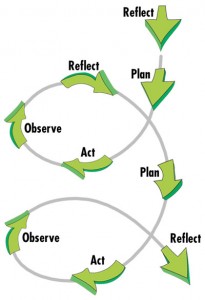We all have memories of “bad” teachers.
I remember sitting my high school government class in amazement as my teacher simply wrote the notes that we were to copy on the chalk board. Day after day he would write notes and we would copy them as the dust of previous classes caked onto the chalkboard. One day I asked, “Can you erase the board more clearly?” He responded that I could ask any question about the content of the notes but that the notes themselves would not change.
In my calculus class, my teacher sat us in traditional rows in alphabetical order. At the beginning of each class she would come around and check our homework. I of course being at the end of the alphabet would have my homework checked last. By the time she would get to me she would apologize that she did not have time to answer my questions, she had to start class (see also a study on Rows vs. Tables: A Study on Classroom Seating Arrangements).

I was frustrated. I dropped calculus and muddled through my government class.
Now, obviously these were not “bad” people; they cared about their students. Simply, their lesson presentations were “bad”. These teachers had their routines and were not about to change them. Sound familiar with your experiences?
As teachers we get to decide what kind of teachers we want to be. Much of this is based on our past experiences when we were students or from the observations of other teachers. We all want to be “great” teachers, but what makes a teacher “great”?
Part of the answer lies within ourselves, our personalities, and our level of comfort in the classroom. Not all of us are dynamic, spontaneous, or the most popular teacher in the school. But how do we become that “great” teacher? One way to unlock the great teacher within us is to engage in reflection through journaling.
Why journaling? Why can’t we just become this great teacher that we envision in our own minds?
Through journaling we actively reflect on our teaching practices. We can write about our fantastic days as well as our horrible ones. What went well in your classroom today? Why did students respond so well to your lesson? Why did first period respond differently to the same lesson than 7th period? Reflection becomes a necessary habit.
We simply need time to relax, reflect, and adjust. The most successful teachers I know are the most flexible. They can identify what went well or what went wrong and they can adjust; often from one class to the next. The other advantage to journaling comes from long term reflection. At the end of the trimester, quarter, or year reflect on your experiences, review your journal and ask, “How can I improve this lesson next time?”
In one study, a triad journaling system was established between a first year teacher, her mentor, and her principal. Issues such as the challenges in teaching in an urban school, principal expectations, and racial and cultural environmental issues were openly discussed in a supportive reflective environment (see Mentoring, Reflection, and Reciprocal Journaling 2003).
Long term reflection will help us hone our craft of teaching into the subtle art form that master teachers seem to have naturally.
Sources
Tillman, Linda C. "Mentoring, Reflection, and Reciprocal Journaling." Theory Into Practice 42, no. 3 (2003).
Wheldall, Robert, and Yin Yul Lam. "Rows vs. Tables II. The Effects of Two Classroom Seating Arrangements on Classroom Disruption Rate, On-task Behavior, and Teacher Behavior in Three Special School Classes." Educational Psychology 7, no. 4 (1987).
"Why Reflect?" Reflection For Learning. <https://sites.google.com/site/reflection4learning/why-reflect> (31 Dec. 2011).

